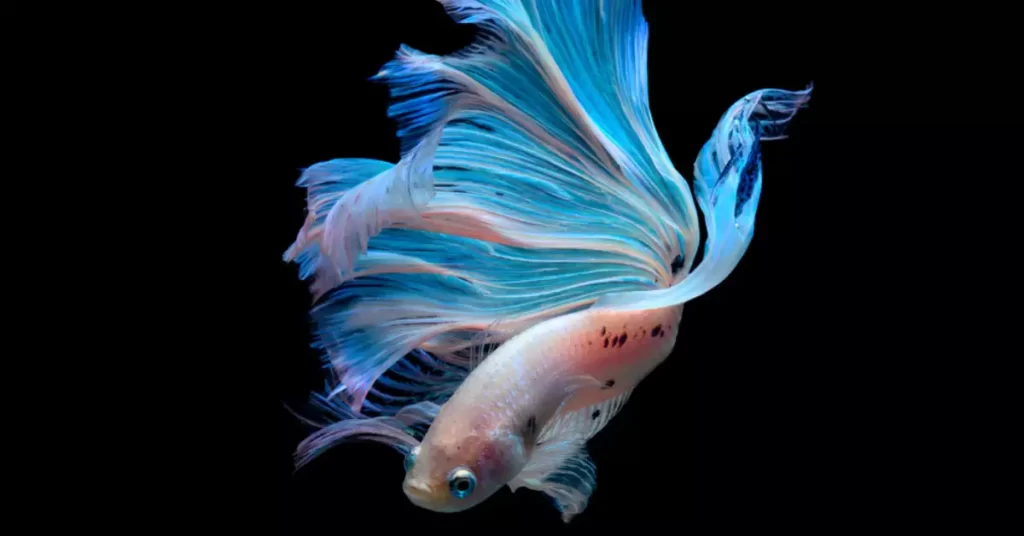Betta fish are beautiful, vibrant creatures that are popular among aquarium enthusiasts. However, did you know that these small, captivating fish can experience depression?
In this comprehensive guide, we will delve into the complex world of betta fish emotions, discuss the signs of depression in betta fish, and provide tips on how to ensure their mental well-being.
Understanding Betta Fish Behavior
Before we dive into the topic of depression in betta fish, it’s essential to understand their typical behavior patterns to distinguish between normal and abnormal behaviors.
Normal Betta Fish Behavior
Betta fish are known for their striking colors, long-flowing fins, and unique personalities.
They are typically active and curious, exploring their environment and occasionally flaring their gills to assert dominance or defend their territory.
Bettas are also known to create bubble nests, which are a sign of healthy reproductive behavior.
Abnormal Betta Fish Behavior
Some behaviors might indicate that something is wrong with your betta fish, such as:
- Lethargy or inactivity
- Loss of appetite
- Unusual swimming patterns
- Clamped fins
- Hiding for extended periods
Can Betta Fish Get Depressed?
Yes, betta fish can experience depression. Although it might seem strange to attribute human emotions to fish, recent studies have shown that fish are more complex than previously believed.
They can perceive their environment, learn from their experiences, and even exhibit emotional responses.
Signs of Depression in Betta Fish
Identifying depression in betta fish can be challenging, but some common signs include:
- Lethargy: Depressed betta fish may become less active than usual, often staying in one spot or resting at the bottom of the tank.
- Loss of appetite: Depressed bettas may eat less or refuse food altogether.
- Unusual swimming patterns: Depressed betta fish might swim erratically, aimlessly, or exhibit repetitive behaviors.
- Clamped fins: A depressed betta may keep its fins clamped close to its body.
- Hiding: Depressed bettas might spend more time hiding than usual.
Causes of Betta Fish Depression
Several factors can contribute to betta fish Depression, including:
- Poor water quality: Insufficient water quality can cause stress and illness, leading to depression in betta fish.
- Lack of stimulation: A barren or uninteresting environment can lead to boredom, which may contribute to depression.
- Inadequate space: Bettas need sufficient space to swim and explore, and a cramped tank can cause stress and depression.
- Incompatible tank mates: Aggressive or incompatible tank mates can cause stress and negatively impact a betta’s mental health.
- Poor diet: A diet lacking in proper nutrition can lead to a weakened immune system and increased susceptibility to stress and depression.

How to Help a Depressed Betta Fish
If you suspect that your betta fish is experiencing depression, take the following steps to improve their well-being:
Improve Their Environment
Ensure that your betta fish’s tank is clean, well-filtered, and heated to an appropriate temperature (76-80°F).
Provide hiding spots, plants, and other decorations to create a more stimulating and comfortable environment.
Introduce Mental Stimulation
To keep your betta fish mentally engaged, incorporate toys such as mirrors, floating ping pong balls, or sinking objects that they can push around.
Rearranging their tank decorations periodically can also help provide a sense of novelty and exploration.
Maintain a Proper Diet
Feed your betta fish a balanced diet of high-quality pellets or flakes, supplemented with occasional treats like bloodworms, brine shrimp, or daphnia.
Overfeeding can lead to obesity and lethargy, so be sure to provide the appropriate amount of food.
Regularly Monitor Their Health
Keep an eye on your betta fish’s behavior, appearance, and overall health. If you notice any signs of illness or continued depression, consult a veterinarian or aquarium specialist for further guidance.
Preventing Betta Fish Depression
To minimize the risk of depression in betta fish, follow these best practices:
- Maintain a clean, well-maintained tank with proper water parameters.
- Provide an enriching environment with ample space, hiding spots, and decorations.
- Ensure compatibility with any tank mates, or keep your betta fish alone if necessary.
- Feed a balanced diet and avoid overfeeding.
- Monitor your betta fish’s health and behavior regularly.
The Role of Aquarium Keepers
As a responsible aquarium keeper, it’s essential to prioritize the mental and physical well-being of your betta fish.
By providing a suitable environment, proper diet, and mental stimulation, you can help ensure that your betta fish thrives and lives a happy, healthy life.
FAQs
Can betta fish recognize their owners?
Yes, betta fish are known to recognize their owners and can even be trained to perform tricks.
How long do betta fish live?
With proper care, betta fish can live for 3 to 5 years.
Can betta fish live with other fish in the same tank?
Betta fish can coexist with some other fish species, but they are territorial and may become aggressive with certain tank mates.
It’s essential to research compatibility before introducing new fish to your betta’s environment.
Conclusion
Betta fish are fascinating creatures with complex emotional lives.
It’s crucial for aquarium keepers to understand the signs of depression in betta fish and take the necessary steps to ensure their fish’s mental and physical well-being.
By creating a nurturing, engaging environment and providing proper care, you can help your betta fish live a happy, healthy life.